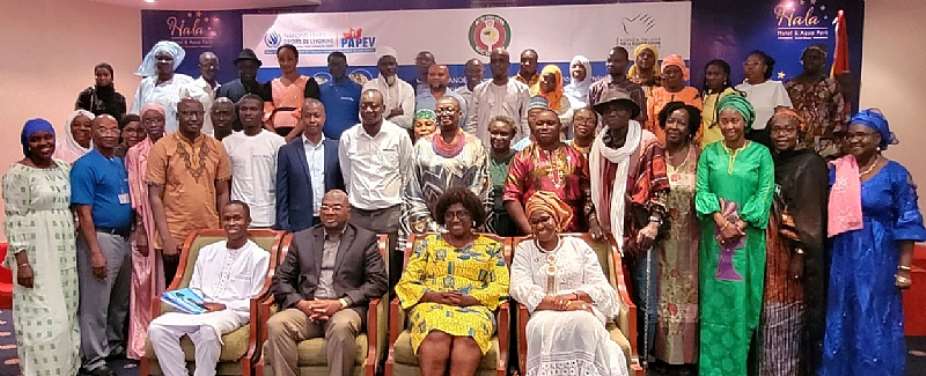The ECOWAS Commission, through its Gender Development Centre (EGDC) and in partnership with the West Africa Regional Office of the UN High Commissioner for Human Rights (OHCHR-WARO), is organising a regional capacity building workshop for staff of childcare centres in the beneficiary countries of the Support Project for the Protection of Child Victims of Rights Violation (PAPEV) from 28 to 30 June, 2022 in Bissau, Guinea Bissau.
The objective of this workshop is to help enhance the quality of protection services in centres for child victims of abuse and rights violation through the capacity building of childcare centre staff and administrators.
The workshop was officially launched by H.E. Mrs Maria DA CONCEIÇÃO EVORA, Guinea Bissau’s Minister of Women Affairs, Family and Social Solidarity. In her speech, she emphasised the importance of protecting the rights of children, victims of abuse, especially those moving across borders in the sub-region. "This workshop is an opportunity for all to effectively contribute to meeting the challenges related to the legal and psychosocial support of child victims of rights violation, but also to capitalize on the achievements of the PAPEV project regarding the protection of children in cross-border movement," added the Guinea Bissau Minister.
Prior to the official opening of this workshop, participants had the opportunity to listen to a series of remarks. First, the President of the Children's Parliament of Guinea Bissau who thanked the Government of his country and partners including ECOWAS and OHCHR for every effort to protect the rights of children.
In turn, speaking on behalf of Commissioner Siga Fatima JAGNE in charge of Social Affairs and Gender Department of the ECOWAS Commission, Mr Awudu Ahmed GUMAH, Head of Planning, Research, Monitoring and Evaluation and Acting Director of the EGDC, mentioned in his speech that building the capacity of child protection centres will lay the foundation for a more sustainable response to the growing threats of abuse and neglect of child rights in ECOWAS Member States. He continued his remarks by saying that:
“Since the inception of the PAPEV project, ECOWAS and OHCHR have worked tirelessly to assist Member States to address critical issues related to the promotion of child rights and to protect children from human rights violations, particularly children on the move, including sexual and economic exploitation, violence, sexual slavery, rape, trafficking, early marriage, prostitution, female genital mutilation, begging, among others”.
Speaking on behalf of Mr André ORI, the Regional Representative of OHCHR-WARO, Mrs Aminata KEBE, Human Rights Specialist at OHCHR and Regional Coordinator of PAPEV recalled that the research and analysis carried out in Guinea, The Gambia, Mali, and Niger, made it possible to measure the difficulties facing the childcare centres but especially the challenges related to meeting the needs of the children. She concluded by stating that: “poor logistic resources and inadequate psycho-social care for children are the two main lessons drawn from this research, which has led to relevant actions to support countries in strengthening their national child protection systems”.
The 30 participants in this workshop are from the six beneficiary countries of the PAPEV project (The Gambia, Guinea, Guinea Bissau, Mali, Niger, and Senegal) with 5 participants per country, the ECOWAS Gender Development Centre (EGDC) and the West Africa Regional Office of the UN High Commissioner for Human Rights (OHCHR-WARO).
During this workshop, there will be an official handing over of equipment and materials granted by the project to the Bissau AMIC Centre, Gabu AMIC Centre and the SOS Talibé Childcare Centre in Bafata, the Republic of Guinea Bissau.
Funded by the Italian Agency for Development Cooperation (AICS), PAPEV is being executed in partnership with the governments of the six beneficiary countries: The Gambia, Guinea, Guinea Bissau, Mali, Niger, and Senegal. The aim of the PAPEV project is to support the States in their respective efforts to promote and protect child rights through the implementation of recommendations of international and regional child rights protection mechanisms and the promotion of a safe and fair environment for child victims of rights violation by addressing their legal, judicial, and social needs.
Source: ECOWAS





 Dumsor: Don't rush to demand timetable; the problem may be temporary — Atik Moha...
Dumsor: Don't rush to demand timetable; the problem may be temporary — Atik Moha...
 Space X Starlink’s satellite broadband approved in Ghana — NCA
Space X Starlink’s satellite broadband approved in Ghana — NCA
 2024 election will be decided on the grounds of the economy; choice of running m...
2024 election will be decided on the grounds of the economy; choice of running m...
 Dumsor: We're demanding less; just give us a timetable — Kwesi Pratt to ECG
Dumsor: We're demanding less; just give us a timetable — Kwesi Pratt to ECG
 Do I have to apologise for doing my security work, I won’t – Simon Osei-Mensah r...
Do I have to apologise for doing my security work, I won’t – Simon Osei-Mensah r...
 All my businesses have collapsed under Akufo-Addo — NDC Central regional chair
All my businesses have collapsed under Akufo-Addo — NDC Central regional chair
 Military, Prison Officers clash in Bawku, three injured
Military, Prison Officers clash in Bawku, three injured
 GRA-SML contract: MFWA files RTI request demanding KPMG report
GRA-SML contract: MFWA files RTI request demanding KPMG report
 Court threatens to call second accused to testify if NDC's Ofosu Ampofo fails to...
Court threatens to call second accused to testify if NDC's Ofosu Ampofo fails to...
 Family accuses hospital of medical negligence, extortion in death of 17-year-old...
Family accuses hospital of medical negligence, extortion in death of 17-year-old...
